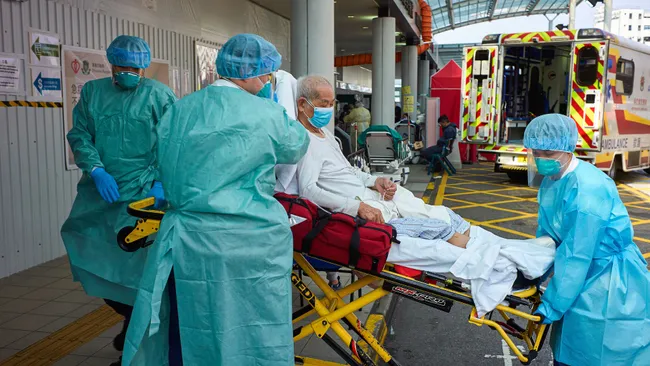 |
| SOPA Images via Getty Images |
The COVID-19 pandemic altered life as we know it and claimed millions of lives in the process, and yet, the next pandemic might be even worse. A new book, called "The Big One: How We Must Prepare for Future Deadly Pandemics" (Little Brown Spark, 2025), describes a theoretical-but-plausible scenario in which a new and deadlier coronavirus emerges and quickly spreads around the world, despite public health officials' best efforts to stop it.
In the text, Michael Osterholm, founding director of the Center for Infectious Disease Research and Policy (CIDRAP) at the University of Minnesota, and award-winning author Mark Olshaker discuss lessons we should take away from past pandemics in order to mitigate the harms that a "SARS-3" could wreck on the global population. The following is an excerpt from the book.
Even if you are lucky enough not to contract the airborne virus, someone you know and care about most likely will. But even beyond that, a pandemic would so severely affect the global supply chain that both ordinary and durable goods, food, medicine, and the staples of everyday life would be in short supply or not available. There would be major shortages in all countries of a wide range of commodities, not only food, but also soap, paper, light bulbs, and gasoline, as well as parts for cars, airplanes, trains, military equipment, municipal water pumps, and electrical generation plants. Even coffins to bury the dead would be in short supply. With Covid, we saw just how connected the world's economies are.
The message here: When it comes to fighting microbes, America First only goes so far. In the United States, most of our critical and, in many cases, lifesaving generic drugs come from China and India, both of which would be prime targets for viral spread, resulting in shutdown of manufacturing plants. We have been advocating for years for this type of pharmaceutical manufacturing to be reestablished in the United States and other countries we can count on, as a matter of national security. But that would necessarily involve some form of government subsidy, since the profit margin on most generics is extremely thin, and even overseas, companies are getting out of the business. This means that as consolidation in China and India has occurred, it has created a gaping vulnerability for the United States and the Western world.
The truism that no one is completely safe until everyone is safe is a truism because it happens to be true. In the words of the late Nobel laureate Dr. Joshua Lederberg, whom we quoted at the beginning of Chapter One, "Bacteria and viruses know nothing of national sovereignties. . . . No matter how selfish our motives, we can no longer be indifferent to the suffering of others. The microbe that felled one child in a distant continent yesterday can reach yours today and seed a global pandemic tomorrow." --->READ MORE HERE
 |
| Manuel Balce Ceneta/Pool/Reuters/File |
Former troops kicked out of military service for refusing to get the Covid-19 vaccine will receive “special category VIP or ‘white glove’ treatment” if they rejoin, the Pentagon said Thursday in conjunction with the release of a memo to military service leaders. The changes follow criticism from some social media influencers about how returning troops have been treated at military intake facilities.
Chief Pentagon Spokesperson Sean Parnell said in a statement the changes would accompany a review of the Pentagon’s Covid-19 vaccine policy that would examine “what occurred, why, and what the Department will do to ensure that it never happens again.”
The memo, signed by Under Secretary of Defense for Personnel and Readiness Anthony Tata, told military service leaders to make changes at Military Entrance Processing Stations, or MEPS, sites where recruits undergo medical screenings, aptitude tests and other final checks before being brought into military service.
“As these efforts continue, the Military Departments are directed to prioritize special-category VIP treatment for affected former service members,” Tata wrote.
Special treatment for returning troops includes accepting late arrival, being given priority processing, and a “trained escort to expedite screening,” the memo said.
The reinstatement of troops kicked out over the vaccine mandate has been a priority for Defense Secretary Pete Hegseth, though only a fraction of those who were separated have put back on a military uniform. As of May this year, only 13 people of more than 8,000 removed from service had returned under the Pentagon’s policy to reinstate them. Asked Friday for updated numbers a Pentagon spokesperson said the agency had no update to those figures. --->READ MORE HEREFollow links below to relevant/related stories and resources:
Do young people need Covid boosters? Research shows more protection for ages 65 and older
Severe COVID may carry higher risk of long-term conditions requiring hospitalization through 6 months
USA TODAY: Coronavirus Updates
WSJ: Coronavirus Live Updates
YAHOO NEWS: Coronavirus Live Updates
NEW YORK POST: Coronavirus The Latest
If you like what you see, please "Like" and/or Follow us on FACEBOOK here, GETTR here, and TWITTER here.

No comments:
Post a Comment